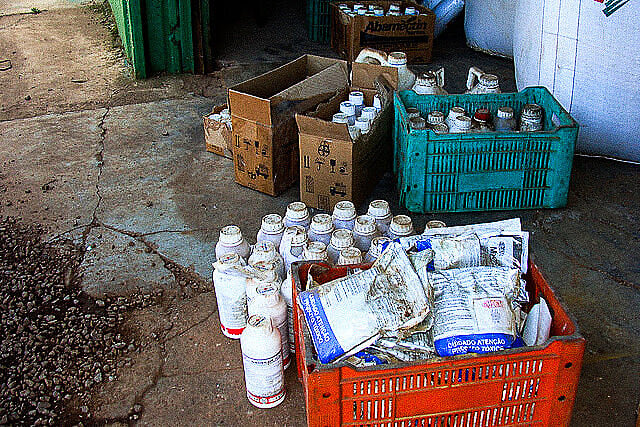The illegal pesticide market — where stolen or smuggled products are traded — is growing in Brazil, according to surveys conducted by agribusiness-related organizations.
A report by the Institute for Economic and Social Development of Borders (Idesf), for example, showed that 20 percent of the agrochemicals traded in the country come from illegal sources, while the Federation of Industries of the State of São Paulo (Fiesp) estimates that that rate can be as high as 24 percent. The surveys are based on information provided by law enforcement and state authorities.
The illegal trade leads to a lack of control over the chemical products applied to crops, which often results in citizens eating food with substances that are illegal and, obviously, bad for their health. According to the organizations, most of these illegal chemicals are smuggled into Brazil through the border, especially coming from Paraguay, where there is little-to-none control over agrochemical production.
The president of the Idesf, Luciano Stremel Barros, underscores that products that fall short of recommended standards are usually used by Brazilian consumers, as big corporations have their own control over the agrochemicals they use. “They [big businesses] end up conducting more checks on the products they are buying for export purposes. That means that we are poisoning the domestic market. This kind of [illegal] product ends up reaching Brazilians,” he says.
Barros says that Brazilian buyers connive at the smuggling of illegal pesticides. “If there were no buyers, there would be no illegal market,” he argues, adding that there are different types of buyers.
Smuggled or legal, agrochemicals are hazardous nonetheless
Alan Tygel, the coordinator of the Permanent Campaign against Agrochemicals and for Life, says that consuming chemically unverified products could aggravate the pesticide poisoning of the Brazilian population.
“In the cases of agrochemicals that are smuggled in from other countries, there is no control over their manufacturing process. These chemicals may contain even more hazardous substances than the agrochemicals themselves,” he points out.
::Brazil approved more new pesticides in 200 days than European Union did in 8 years::
Tygel points out that advocating against the use of smuggled products does not mean advocating for chemicals that are approved in Brazil. He underscores that fighting the illegal trade cannot be used as a false alert by the agrochemical industry.
“This rhetoric [of the risk of illegal products] is largely coming from the agrochemical industry. They try to blame all the problems caused by pesticides on illegal, smuggled products,” he argues.
The coordinator of the anti-pesticide campaign also says that the illegal trade of agrochemicals does not minimize the risks posed by legal products, which are also bad for human health.
“The industry resorts to this rhetoric claiming that the problem is about not using the products properly, about not following the guidelines, claiming that the problem is the illegal agrochemicals, but obviously one thing does not make up for the other. Having no illegal chemicals wouldn’t make it better [to have approved pesticides].”




